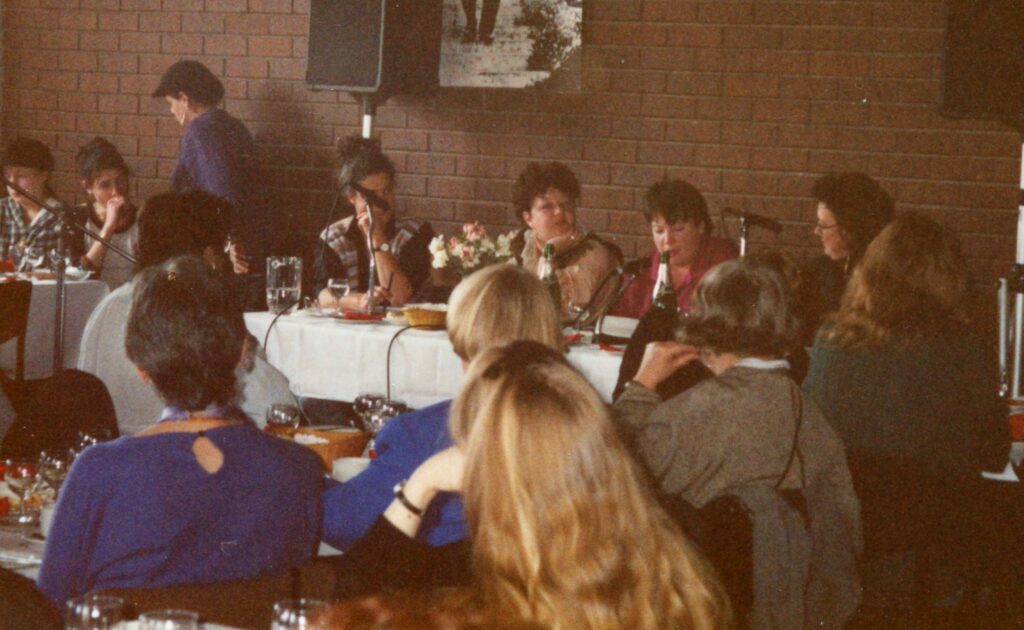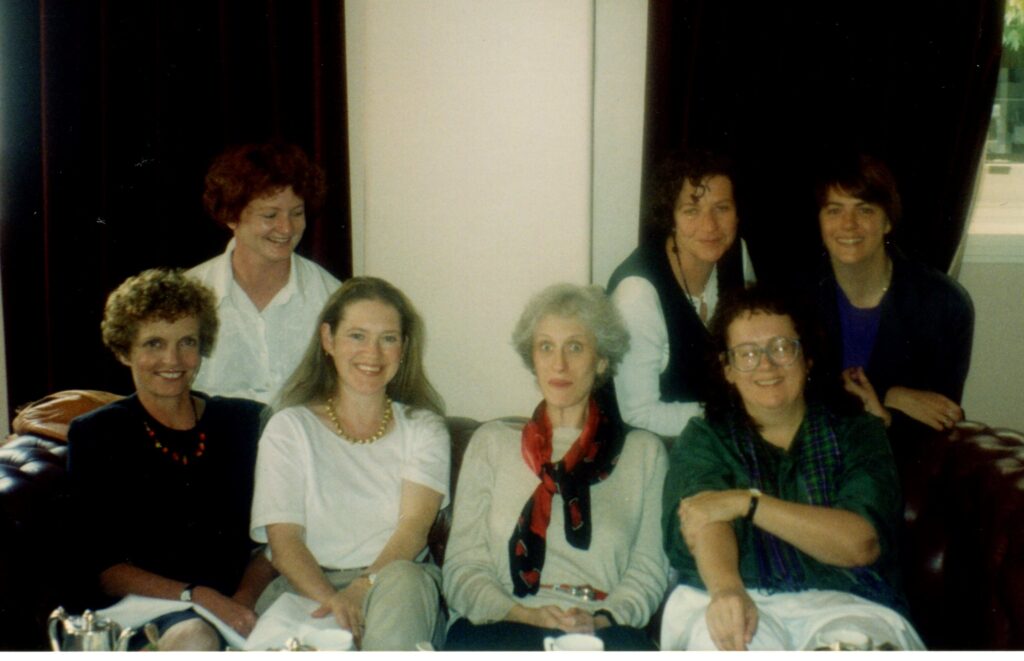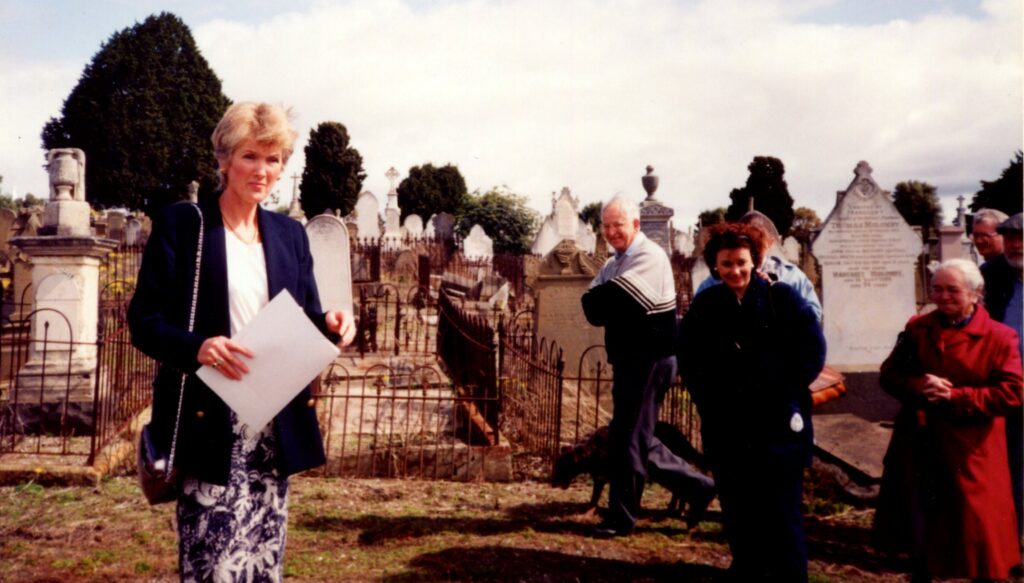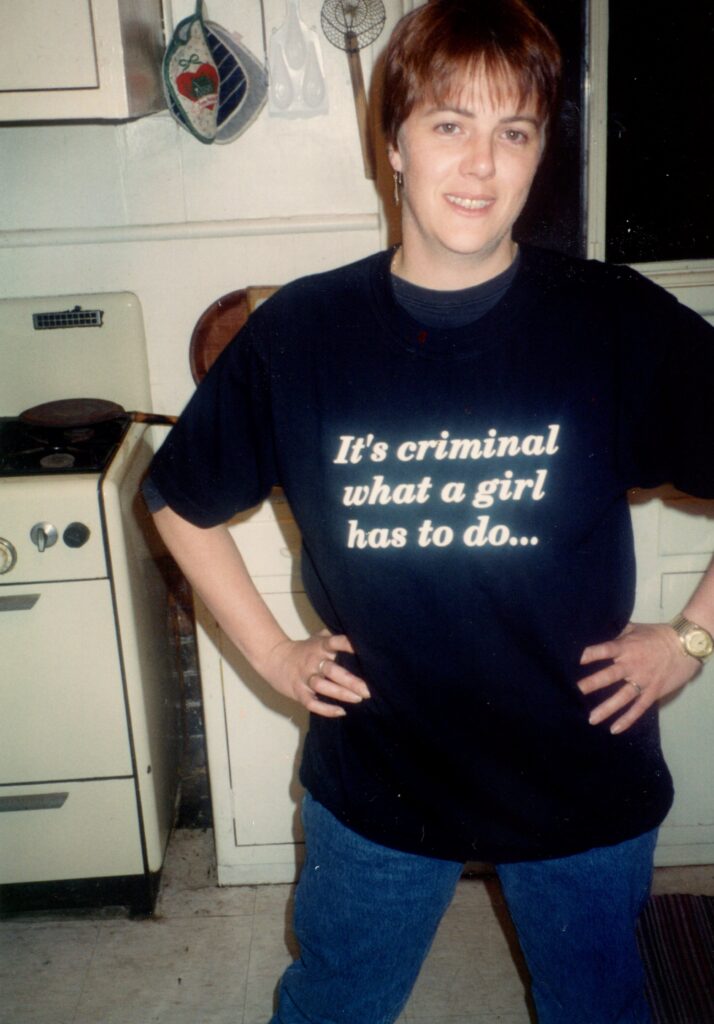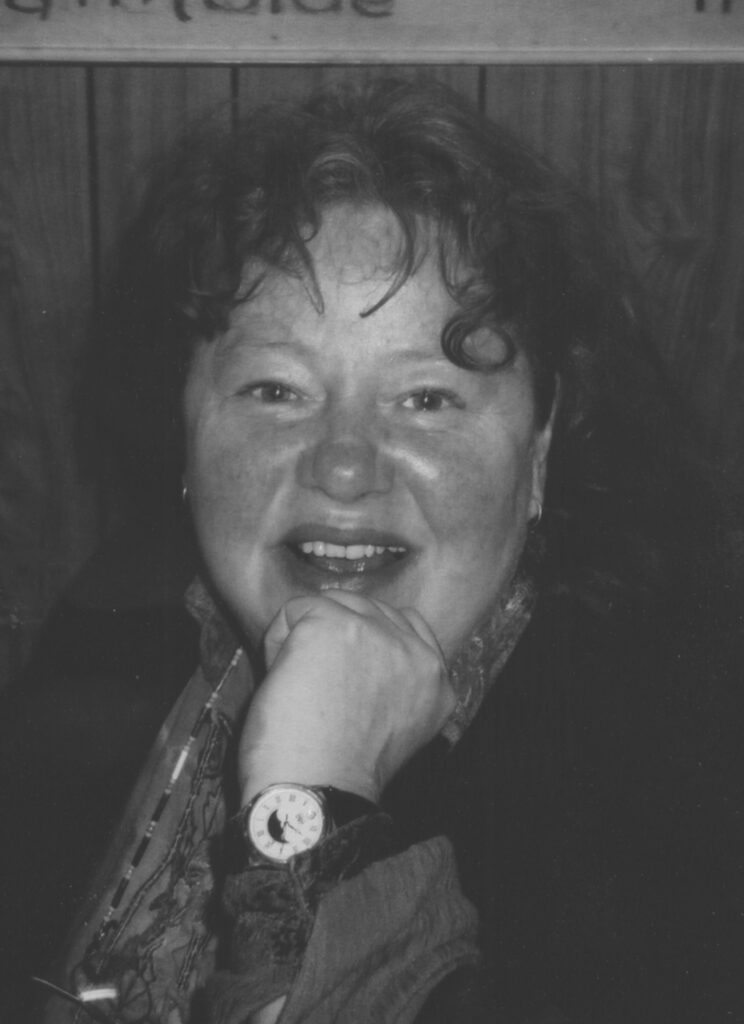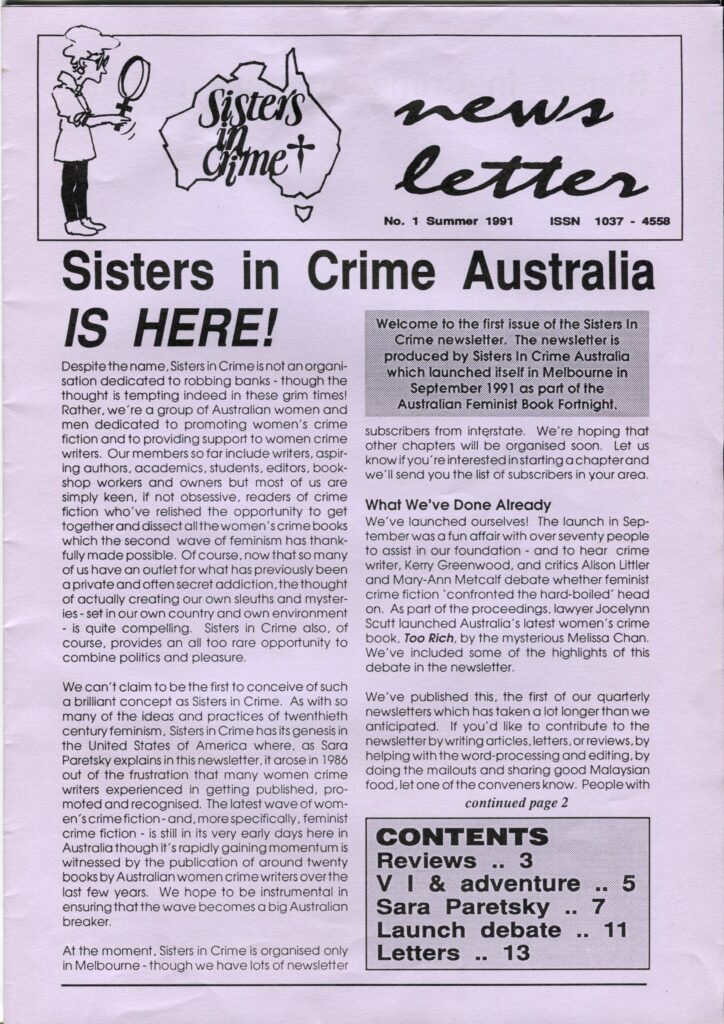Co-founder (and Secretary) Carmel Shute reminisces about how Sisters in Crime came to be.
Sisters in Crime Australia has turned 30. On 22 September in 1991, a Sunday, we launched our fledging organisation at the Melbourne Feminist Book Fortnight with a debate entitled “Feminist Crime Fiction: Confronting the Hard-boiled Head On”.
I compered an entertaining panel comprising a trail-blazing new crime writer by the name of Kerry Greenwood, English teacher Mary-Ann Metcalf, and Alison Littler, who was completing her doctorate on women’s crime fiction. We’ve since ended up adopting this debate format for hundreds of events. As part of the event, lawyer Jocelynn Scutt launched Too Rich by the mysterious Melissa Chan.
The crowd was enthusiastic and a lot of women joined up on the day, including Lindy Cameron who is our current Vice-President. The venue, the Democritus Club, a left-wing Greek haunt in Carlton, is no longer there but, amazingly, three decades later, Sisters in Crime is still going strong. We now have over 500 members with chapters in Queensland, New South Wales, South Australia, and Western Australia. Some of us are writers, scholars, librarians, TV producers, or booksellers, but mostly we’re simply keen (if not obsessive readers) readers and viewers.
Sisters in Crime’s origins were rather accidental. Fittingly, it all started at the ABC where corpses used to line the corridor (so many redundancies!). I was then working for the ABC Staff Union and the previous year I’d been invited to Canada to present a paper to an international women’s conference.
Believing it would be my only time ever in North America, I decided to spend a couple of weeks interviewing my favourite women crime writers for Radio National’s “Coming Out Show”, its only feminist program (alas long defunct). You didn’t have to be a professional broadcaster to get a gig in those days and I certainly wasn’t, though I contributed quite a few items over the years.
Through the eighties, I had been swept away by the new wave of feminist crime fiction spearheaded by American writers like Sara Paretsky. At the Bouchercon – the biggest and most prestigious crime convention in the world – in 1986, Paretsky had formed an organisation in the US called Sisters in Crime. The motive – women crime writers were not getting a fair deal in the crime writing world; they were not getting reviewed, promoted, or recognised in equal numbers.
On that trip to America in 1990, I interviewed Sue Grafton, Sara Paretsky, Mary Wings, Katherine V. Forrest, Lauren Wright Douglas, and Barbara Wilson. The resulting 45-minute program, called “Sisters in Crime,” went to air on Easter Friday 1991. I offered to send listeners a copy of a feminist crime bibliography (which, of course, I hadn’t done).
The following Monday, the ABC science unit in Sydney where my co-producer Janet Parker worked, was besieged with calls. Even the ABC’s science guru, Robyn Williams, ventured to ask what the fuss was about.
Altogether, 176 people rang or wrote in (ah, the days before the internet), which was apparently a record for Radio National. For my sins, this response seemed to be a good basis on which to build an organisation. Luckily, at that stage, privacy rules had not been introduced.
It was a dark and stormy night, the occasion of our first meeting on 24 April, 1991. Only five die-hard women crime readers braved the weather – Mary-Ann Metcalf, Rivka Pile, Jan Van Bommel, Claudia Hirst, and myself (and I didn’t even have to leave the warmth of my lounge room).
Setting up an organisation seemed to be a big ask, but we did it, with that debate five months later setting us on a ride we had no notion would last so long.
Our first quarterly newsletter was published over the summer of ’91-92 and the content still has a familiar ring. It included highlights of the founding debate and my interview with Sara Paretsky; reviews of Patricia Cornwell’s second novel, Body of Evidence, and Kerry Greenwood’s third Phryne novel, Murder on the Ballarat Train (she’s now up to book 21); an article about Paretsky’s fictional V I Warshawski and the virtues of adventure; a swag of complimentary letters; and an article by Lucy Sussex, asking if we should put Ellen Davitt’s name on her unmarked grave in Geelong Cemetery.
And we did! In 1993, Sisters in Crime organised for English novelist, Joanna Trollope, a distant relative, to place a plaque on Davitt’s headstone, and Force and Fraud, Australia’s first full-length crime novel (1856), was reissued with an introduction by Lucy Sussex. Clan Destine Press re-issued Force and Fraud as an e-book in 2015.
In 2001, Davitt’s name was immortalised in Sisters in Crime’s annual awards for best crime books. In 2019, in pre-COVID times, we were delighted to learn that Geelong Cemeteries Trust had created a unique walking tour of the Geelong Eastern Cemetery, called History Alive, which features Ellen Davitt. Visitors are guided around by actors playing the parts of ‘residents’ of the cemetery, and on the way around, they meet and hear stories of other significant residents who are ‘discovered’ standing by their graves. Over 1700 people have participated in these tours.
Sisters in Crime was understandably thrilled when Paretsky visited Melbourne on International Women’s Day in 1994. Convenors enjoyed a slap-up morning tea with Paretsky at the Windsor Hotel (pictured below). That night we hosted a dinner for 600 fans at Prahran Town Hall – still our biggest-ever event. Some of us (most particularly me) were star-struck.
Sisters in Crime Australia had planned to celebrate its 30th anniversary hot on the heels of its 28th Scarlet Stiletto Awards on Saturday 27 November at the glorious new Victorian Pride Centre in Fitzroy Street, St Kilda, Melbourne, just up the road from Leo’s Spaghetti Bar, where we met for 16 years in the backroom (just past the men’s toilets).
Alas, thanks to COVID, the Scarlet Stiletto Awards will now be Zoomed and we are postponing the 30th anniversary bash until early next year. We need to party in person. Keep your fingers crossed, Sisters in Crime and Brothers in Law.
You can catch up to my recent interview with Alex Café here (13 minutes) and my grilling for U3A Port Phillip by Tara Mitchell here (53 minutes).
